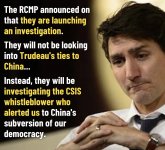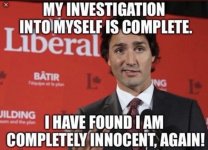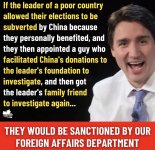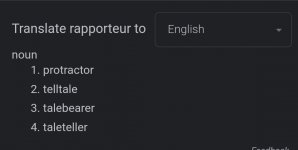Action speaks louder than words, but not nearly as often.
Mark Twain’s warning should be borne in mind by the opposition parties as they continue to negotiate with the government over a public inquiry into foreign interference in Canadian elections.
The Liberals say they are open to a public inquiry,
after the resignation of special rapporteur David Johnston.
The government’s fixer, Dominic LeBlanc, has been drafted in to retrieve another
Charlie Foxtrot situation and says he has asked the opposition parties to come up with potential names to lead an inquiry and its terms of reference.
Those talks are said to be close to completion, with the government having accepted in principle that a public inquiry is the only way forward.
But the opposition should be en garde. For a government that says it has nothing to hide, this government is acting as if it absolutely has something to hide.
The government has accepted a public inquiry in principle, but the opposition parties should be en garde

apple.news
When Justin Trudeau announced his intention to appoint a special rapporteur in late March, he also asked two (semi) independent committees to conduct their own investigations — the National Security and Intelligence Committee of Parliamentarians (NSICOP) and the National Security and Intelligence Review Agency (NSIRA).
The former is a committee of parliamentarians; the latter a panel of experts, mainly law professors. Both are nominally independent but report to the prime minister and the relevant ministers, rather than to Parliament. Both are more focused on national security accountability and compliance by government departments than on what the Chinese are up to in Canada.
Yet, both have a high level of security clearance and could provide useful information to Canadians, if given the chance.
But this is the point where people should ignore Trudeau’s honeyed words and focus on what his government is actually doing.
The government has accepted a public inquiry in principle, but the opposition parties should be en garde

apple.news
When he asked the two committees to look into foreign interference, he promised transparent investigations. He said he spoke to the chairs of NSICOP (David McGuinty) and NSIRA (Marie Deschamps) and “underscored that Canadians need to have faith in their institutions and deserve answers and transparency.”
Both chairs have been pushing the government to allow their committees to read the same confidential documents that Johnston reviewed to write his first report in May.
The government has jealously guarded documents deemed to be “cabinet confidences” — namely, the record of cabinet discussions that in the Westminster system are deemed top secret.
Last fall, NSICOP wrote to the prime minister complaining that its previous investigations have been hamstrung by lack of access to cabinet documents.
McGuinty told the Senate defence committee that an overhaul of the legislation governing his committee is needed to allow it unfettered access if it is to fulfill its mandate.
But it was only after Johnston’s
first report landed in late May, and the special rapporteur recommended that all documents provided to him also be made available to the two committees, that the government agreed to waive the ban on cabinet documents.
The reluctance to be “open by default,” as per the Liberal election promise, is apparent in the very unusual move taken by NSIRA chair Marie Deschamps this week. She wrote to the prime minister, complaining that only a “limited number of documents” have been released to her panel.
“In order to ensure the integrity of our review and not limit or influence our evidence base, NSIRA must have access to all documents contained in any class of documents provided, rather than a subset of those documents,” she wrote.
From the outset, Trudeau and his ministers have emphasized how much Canadians deserve answers and transparency.
Yet, from day one, the government has appeared to be running interference, thereby stoking suspicions about what it is hiding.
Cabinet should be free to deliberate in boisterous fashion, and in secret. As
I wrote last week, the recommendation of a parliamentary committee to open cabinet discussions to access-to-information requests is ill-advised.
But all members of these two committees are already sworn to secrecy. It seems hard to believe the government is concerned that a panel of eminent judges, lawyers and public servants is going to blab about cabinet secrets on the cocktail party circuit. So, what doesn’t it want them to know, and why?
The apparent attempts to frustrate the intelligence review agency are yet further proof, if any were required, that a public inquiry is the only way to win back the trust of Canadians.
 This is a bit of a weird one in that, the Trudeau Liberals are currently in power, and have won the last three elections, and the Same Trudeau Liberals & the Trudeau Foundation appear to be involved in this issue with the CCP (at this point) up to their eyebrows….so finding someone not affiliated with the Trudeau Liberals and/or the Trudeau Foundation is the bare minimum for at least the appearance of impartiality…which just has not happened yet.
This is a bit of a weird one in that, the Trudeau Liberals are currently in power, and have won the last three elections, and the Same Trudeau Liberals & the Trudeau Foundation appear to be involved in this issue with the CCP (at this point) up to their eyebrows….so finding someone not affiliated with the Trudeau Liberals and/or the Trudeau Foundation is the bare minimum for at least the appearance of impartiality…which just has not happened yet. Ideally finding somebody without an affiliation to any of the political parties would be optimal… but at least not the party that has so far been trying to investigate itself, and consistently has found itself innocent….
Ideally finding somebody without an affiliation to any of the political parties would be optimal… but at least not the party that has so far been trying to investigate itself, and consistently has found itself innocent….

